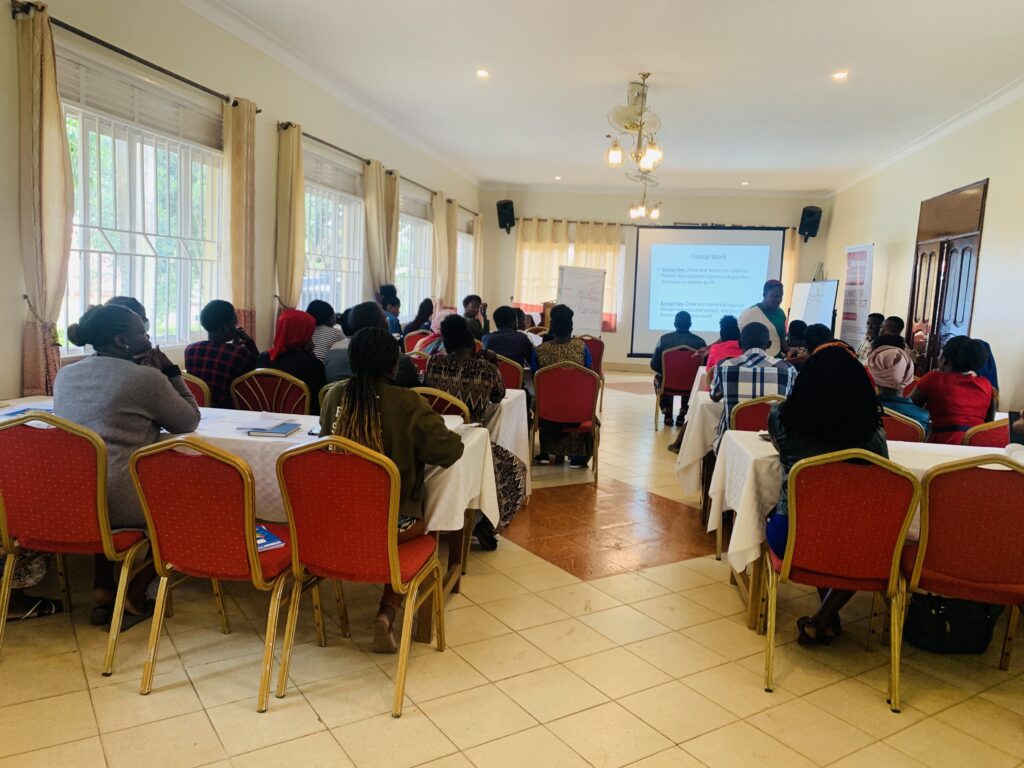In pursuit of its vision to enhance access to family planning services in Mukono District, the Madaraja Foundation, with support from D-Prize, organized a 3-day training as part of the Links for Her Project. The main objective of this initiative was to enhance the skills of private healthcare providers in delivering high-quality family planning services to the community, with a focus on self-injectable contraceptive, DMPA-SC, also known as Sayana Press.
The training was held from 12th to 14th July 2023 and was facilitated by district family planning trainers. A total of 23 participants from 19 private clinics, pharmacies, and drug shops were in attendance, alongside 3 providers from the public sector and 7 dedicated community health workers (CHWs). Public healthcare providers and CHWs were also included in order to enhance the district’s capability to offer DMPA-SC. This involvement was also aimed at reinforcing the collaboration between public and private sectors, augmenting the expertise of CHWs, as they played a crucial role in driving demand within communities and facilitating client referrals, especially during instances of supply shortages in the public sector.
The training marked a significant stride towards improving women’s access to family planning services in the Mukono District. While the training’s comprehensive content contributed to its duration, it was this very depth that ensured healthcare providers received indispensable insights. While ensuring efficient training is crucial, maintaining a balance by prioritizing thoroughness is equally vital for effectively empowering these providers.
Remarkably, participants remained consistently engaged throughout the entirety of the 3-day program. This level of engagement stands as a testament to the training’s efficacy – suggesting that the content was not only pertinent but also well-presented, seamlessly catering to the attendees’ needs.
The impact of the training on participants’ knowledge is particularly noteworthy. Comparative assessments conducted before and after the training revealed a demonstrable enhancement in understanding. This improvement directly reflects the effectiveness of both the training curriculum and its delivery.
As the training drew to a close, the providers displayed remarkable enthusiasm and a genuine eagerness to incorporate the self-injectable contraceptive into their practices. They recognized it as a valuable addition, particularly given that private outlets often face limitations in terms of equipment to provide other methods.
The healthcare workers from each facility formulated workplans, outlining the strategic application of the newly acquired skills. These devised workplans served as tangible evidence of their dedication to enhancing client counseling across all family planning methods, ensuring individuals can make informed choices. Additionally, the plans detailed their commitment to arranging outreach initiatives within their respective areas of coverage. A key focus was also on proactive involvement in client follow-up efforts related to self-injectable contraceptives. By actively assisting clients in overcoming usage challenges and promoting sustained usage, these healthcare workers demonstrated their dedication to fostering improved family planning services in the district.
At the end of the training, the participants expressed their gratitude to the Madaraja Foundation for extending the training opportunity to private providers, a group often overlooked in such initiatives. They also expressed their sincere appreciation for the engagement of the district trainers, who generously shared their hands-on experiences and lessons from various public health facilities in providing DMPA-SC.

The practical session conducted at a public health facility earned unanimous praise as it provided the participants with invaluable hands-on experience in administering DMPA-SC. This tangible practice session was acknowledged as a critical aspect of their learning journey.
Moreover, the participants expressed their deep satisfaction at being brought together. Many acknowledged that while they were familiar with each other’s healthcare outlets, they had never previously interacted. The three-day training period facilitated a newfound connection, enabling them not only to refer clients between outlets but also to engage in consultative discussions. This collaborative spirit among the providers was highly valued.

As the Madaraja Foundation continues its mission to enhance access to quality sexual reproductive health services and information, the undeniable success of this training stands as a robust cornerstone for fostering a healthier, more empowered community within the Mukono District. The combined dedication of all stakeholders promises a brighter trajectory for women’s health and family planning throughout the region.
